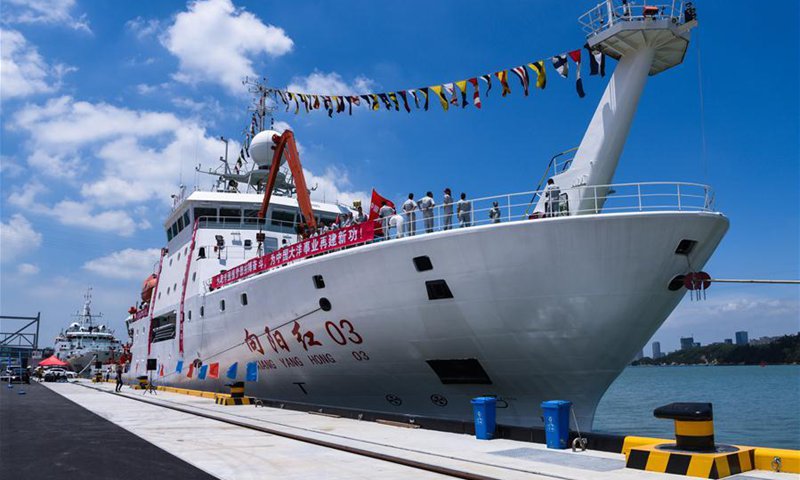
Chinese oceanographic research ship Xiang Yang Hong 03 is ready to set sail in Xiamen, southeast China's Fujian Province, July 14, 2018. Chinese oceanographic research ship Xiangyanghong 03 departed for the country's 50th ocean research expedition Saturday in the western and eastern Pacific Ocean. The ship left Xiamen with 160 personnel on board for a 150-day mission over 15,000 nautical miles. (Xinhua)
While the Maldives is set to host a Chinese research vessel in the coming days, the Indian Navy is closely monitoring the vessel, which could raise fresh concerns from New Delhi, according to media reports. Some Chinese experts consider that India's worries and hype over the Chinese research vessel for their "military purposes" reflects its hegemonic mentality as it perceives South Asia and the Indian Ocean as its sphere of influence.
Chinese research vessel
Xiang Yang Hong 03 is en-route to Male, capital of the Maldives, Reuters reported on Monday, citing open source intelligence researcher Damien Symon's post on social media platform X. The report said the move is likely to raise concerns in India, which has previously viewed the presence of such vessels close to its shores including in Sri Lanka in 2022 as problematic.
India is now closely tracking the vessel as it entered the Indian Ocean through the Sunda Strait of Indonesia on Monday morning. It is expected to arrive in the Maldives by around the first week of February, the Times of India reported on Tuesday.
Indian media described the vessel as a "dual-use" ship that can map oceanographic and other data useful for navigation and submarine operations.
The research vessel is expected to arrive in the Maldives after the country's president Mohamed Muizzu visited China in early January when the China-Maldives bilateral relations was upgraded to a comprehensive strategic cooperative partnership. A number of cooperation documents were signed during Muizzu's visit, covering areas such as joint Belt and Road cooperation, economic and technological development, the blue economy, the digital economy, green development, infrastructure and livelihood assistance.
The current Muizzu administration is dissatisfied with India's infiltration into Maldivian internal affairs in terms of security and politics over the years. This is perceived by some in India as the Maldives leaning toward China and distancing itself from India, Qian Feng, director of the research department at the National Strategy Institute at Tsinghua University, told the Global Times on Tuesday.
"Against this backdrop, the passage of the Chinese research vessel further intensifies the suspicion of Indian officials toward the development of China-Maldives relations," he said.
India has previously conveyed to Sri Lanka its strong objections about such vessels. Sri Lanka has informed India that it will not allow any Chinese research vessel to dock at its ports or operate within its exclusive economic zone (EEZ) for one year, the Hindustan Times reported in December 2023. Some Indian media described it as a "big win" for India.
"The diplomatic actions India previously took to pressure Sri Lanka against the Chinese research vessel seem unlikely to work with the Muizzu government," Qian said, noting that India-Maldives relations are at a delicate juncture.
Muizzu clearly stated that the Maldives does not take sides in this matter and that mutual respect is needed in international relations. So India is cautious not to exert overt pressure on the Maldivian government, the expert noted.
This is not the first time that Chinese research vessel has docked in the Maldives. In 2016, the research vessel
Xiang Yang Hong 01 was open to the public in November that year in Male, which was set to conduct surveys in the southern part of the Eastern Indian Ocean, covering physical oceanography and marine time meteorology, marine chemistry and water body biology as well as marine optics.
In February 2017, the Chinese ambassador to the Maldives met with a delegation from the research vessel
Xiang Yang Hong 09, which docked in Male for the first time, paving the way for marine cooperation between the two countries.
India perceives South Asia and the Indian Ocean as its sphere of influence and is sensitive about China's presence in the Indian Ocean. It is a mix of an inflated yet sensitive hegemonic mentality toward the region, Tian Guangqiang, an assistant research fellow with the National Institute of International Strategy at the Chinese Academy of Social Sciences, told the Global Times on Tuesday.
India might express its serious concerns or protests to the Maldives through diplomatic channels, showing its displeasure, and it could also request reciprocal treatment for its naval ships or other vessels visiting the Maldives, Tian said. "It could leverage pro-Indian political parties or forces within the Maldives to exert pressure, as well as using social media to propagate the so-called 'China threat' narrative."
However, the Maldives might assert that such matters fall under its sovereign rights and are not open to Indian interference, although it might adopt a more balanced approach, he said.




